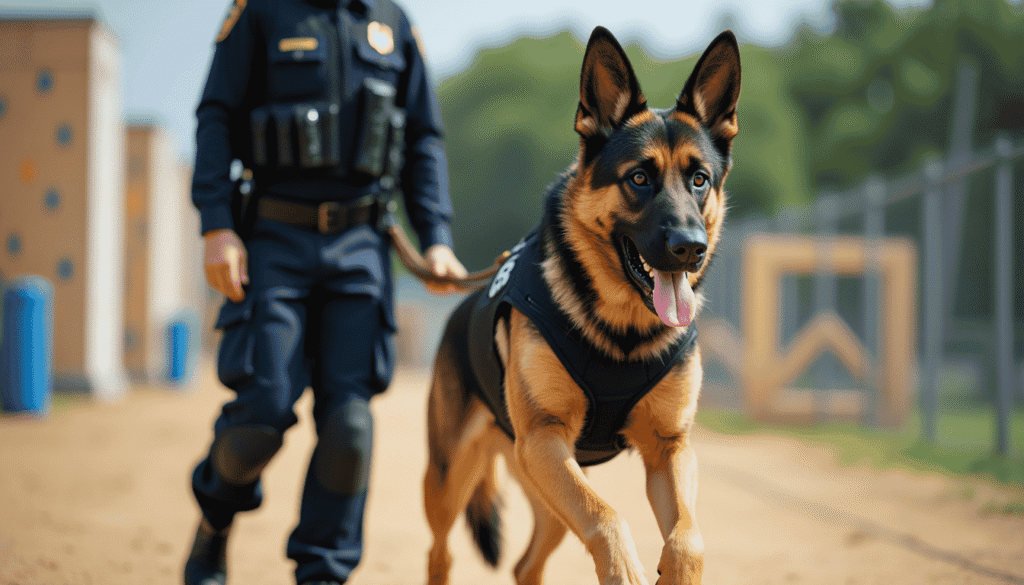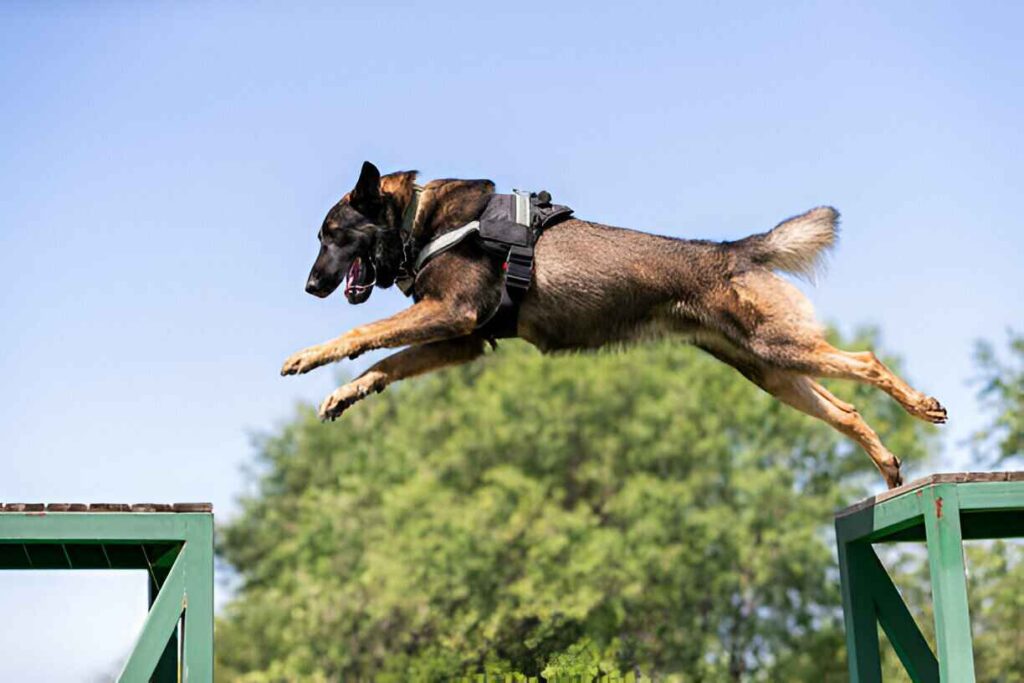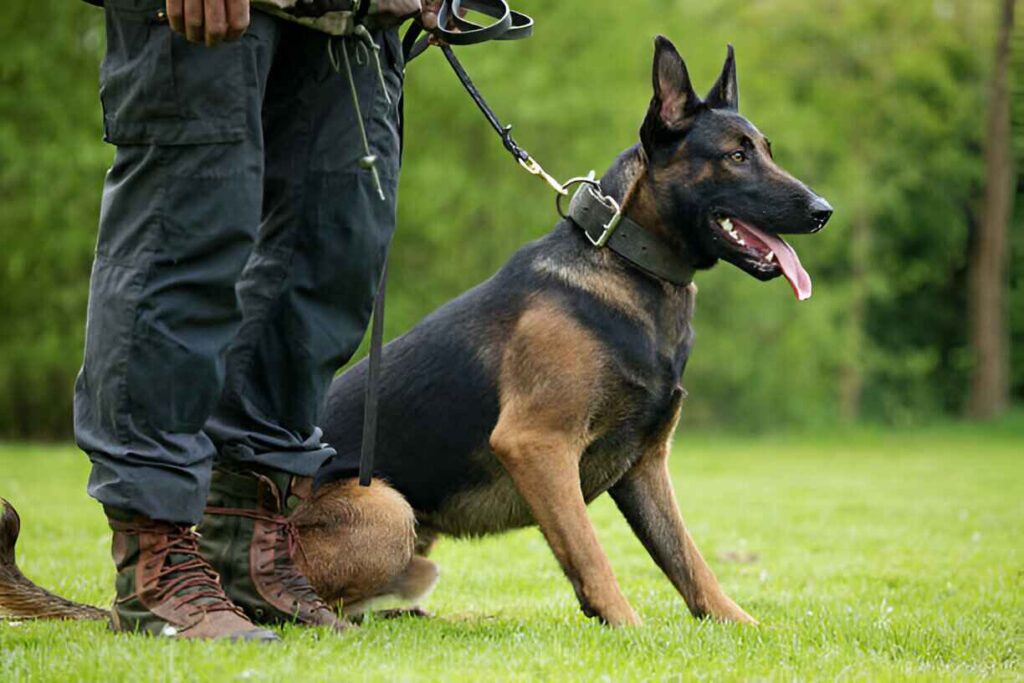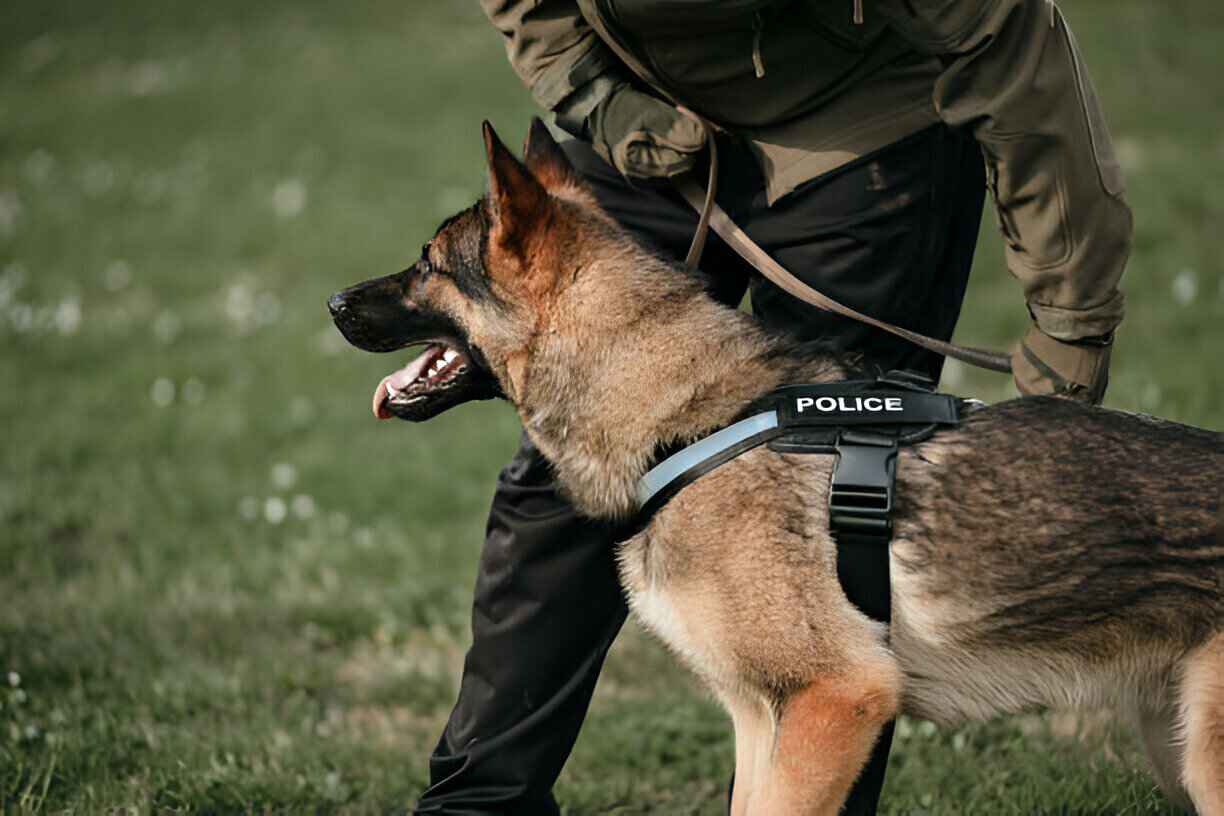German Shepherds have served as police dogs for over a century, and there’s a good reason why. These exceptional dogs have intelligence comparable to a 2.5-year-old child. They can learn complex tasks that make them perfect partners for law enforcement.
These powerful K9 companions are worth their $8,000 to $11,000 price tag. A police German Shepherd runs at speeds up to 30 mph and has a powerful bite force of 238 PSI. Under the right conditions, these dogs can detect scents from as far as 10 miles away.
Let me show you what makes German Shepherds such excellent police dogs. We’ll look at their protective instincts and specialized training. You’ll also learn about their different roles in law enforcement – from finding drugs to chasing suspects.
The Key Traits That Make German Shepherds Ideal Police Dogs
“Untiring, always zealous for duty, always attentive, always ready to serve, such is the character of our shepherd dog. Max von Stephanitz, Founder of the German Shepherd breed, author of ‘The German Shepherd Dog in Word and Picture’, Police forces worldwide choose German Shepherds for K9 units because these dogs are specifically bred to excel in working roles. Max von Stephanitz, a former German cavalry captain, developed this breed in the late 19th century. He deliberately bred them with traits that make them outstanding partners in law enforcement.
High intelligence and quick learning
German Shepherds rank third among the most intelligent dog breeds in the world. Their remarkable mental sharpness helps them size up situations and make quick decisions. These dogs don’t just solve problems well—they’re eager learners who are easy to train.
German Shepherds learn complex tasks with very few repetitions. They speed through training programs that would stump other breeds and quickly pick up everything from simple obedience to specialized detection work. This mix of smarts and trainability makes them valuable to police departments that need capable K9 officers ready for duty.
Loyalty and a strong handler bond
German Shepherds build incredibly deep bonds with their handlers. These dogs see their officers as part of their “pack”. Their natural loyalty leads to better performance in the field.
The trust between handler and dog creates an instinctive communication system that proves invaluable during tense situations. German Shepherds show steadfast dedication to their human partners and often form lifelong bonds.
Obedience under pressure
These dogs stay composed and follow commands precisely, even in chaos. Their ability to stay focused during high-stress situations is vital for police work where dangers lurk everywhere.
German Shepherds have an excellent “off-switch” that lets them switch between work and rest modes. They think before they act—a quality that makes them reliable partners in unpredictable scenarios. This trait also makes them suitable for first-time K9 handlers.
Natural protective instincts
German Shepherds were originally herding dogs that protected livestock, so protection comes naturally to them. Their courage and alertness help them spot potential threats quickly, while they can tell real dangers from normal situations.
These dogs show incredible bravery in threatening scenarios, backed by physical abilities that make them powerful protectors. With proper training, they identify when protection is needed without becoming overly protective.
How Physical Strength and Endurance Support Police Work

German Shepherds have reliable physical traits that make them perfect for police work. These dogs don’t just have impressive mental skills – their physical abilities put them ahead of most other breeds.
Speed and agility in suspect pursuit
German Shepherds are built for chase scenarios. They can run at speeds up to 30 mph when pursuing suspects. Their muscular build lets them accelerate quickly to catch up with anyone trying to escape. These dogs can guide themselves through tough terrain and jump over obstacles without breaking stride.
German Shepherds hit the sweet spot between size and athletic ability. This balance makes them great for city environments where they need to squeeze through tight spaces while chasing suspects. Their body type lets them change direction fast and move with precision – skills that are a great way to get the upper hand during arrests.
Strong bite force for takedowns
A German Shepherd’s bite force measures between 238 and 300 PSI (pounds per square inch), ranking them among the best police dog candidates. While they’re not the strongest biters out there (Kangals lead with 743 PSI), their bite power works perfectly for law enforcement needs.
German Shepherds stand out because of their controlled bite technique. These dogs learn a specific “bite and hold” method that stops suspects without causing too much harm. This careful use of force, plus their scary looks, usually stops people from resisting arrest.
Stamina for long operations
The best part about German Shepherds is their incredible endurance during police operations. Their history as working dogs has created generations of dogs ready for tough physical work. These dogs stay effective through long shifts that would tire out other breeds.
This stamina proves vital during long searches, extended patrols, or detailed evidence detection work. They stay sharp and focused even after hours of hard work. Their double coat helps them handle different weather conditions and work well in heat or cold.
Why German Shepherds Excel in Specialized K9 Roles
“The most striking feature of the correctly bred German Shepherd is firmness of nerves, attentiveness, unshockability, tractability, watchfulness, reliability, and incorruptibility together with courage, fighting tenacity, and hardness.” Max von Stephanitz, Founder of the German Shepherd breed, author of ‘The German Shepherd Dog in Word and Picture’, German Shepherds stand out for their physical and mental abilities and outstanding work in specialized law enforcement. These dogs are a great asset in many critical situations where humans alone might struggle.
Scent detection for drugs and explosives
German Shepherds have an amazing sense of smell with 225 million scent receptors, while humans have only 6 million. Their incredible nose helps them detect scents more than a mile away on land and up to 10 miles in good conditions. These dogs can even smell substances 40 feet underground and detect odors 80 feet deep in water.
These skilled dogs need just three minutes to search a vehicle for narcotics. Their powerful ability to distinguish different scents makes them especially effective at:
- Drug detection: Finding hidden illegal substances in vehicles, luggage, or buildings
- Explosive detection: Spotting dangerous materials before they cause harm
Their exceptional nose and trainability make German Shepherds perfect candidates for this life-saving detection work.
Search and rescue capabilities
German Shepherds shine in search and rescue operations. They’re experts at finding missing people in challenging environments of all types—from earthquake rubble to wilderness settings. These dogs can also track scent trails up to a week old when conditions are right.
These talented K9s specialize in different search methods including trailing (following a specific person’s scent), airscenting (detecting any human scent in an area), and disaster response (finding victims in collapsed structures). Their strength and intelligence are vital assets when time matters most and finding survivors quickly means saving lives.
Crowd control and patrol duties
German Shepherds have helped with crowd control operations since the 1950s. Their powerful presence naturally deters criminal activity during patrols. These dogs are skilled at catching suspects while using controlled force that reduces the risk of serious injury.
On patrol, German Shepherds give officers better situational awareness through their keen senses and protective instincts. They spot potential threats long before their human handlers do, which gives officers vital extra seconds to react in dangerous situations.
How Training Brings Out the Best in a German Shepherd K9 Dog

German Shepherds have natural talents that police training refines into exceptional skills. Their development follows a structured path. It starts with simple exercises and builds up to complex scenarios that create a reliable K9 partner.
Simple obedience and socialization
Police work training for German Shepherds starts with simple commands like sit, stay, come, and heel. These basics create a foundation for all specialized skills. Eight-week old puppies go through temperament tests to check if they’re right for police work.
Socialization plays a key role since K9 dogs need to work well in many settings. Dogs learn to stay comfortable and confident by meeting different people, animals, and experiencing new environments. A German Shepherd with good social skills stays focused on commands even with distractions around them—a crucial trait for police work.
Advanced K9 police training techniques
After mastering obedience, dogs move on to specialized police skills. German Shepherds shine at scent work like finding bodies, helping in search and rescue, and detecting explosives and drugs. Their training keeps pushing them to new challenges instead of just maintaining current skills.
The dogs become skilled at spotting threats and taking the right action, whether they’re protecting their handler, stopping a suspect, or looking for evidence. Trainers make sure the dogs see their work as play, which keeps them excited about their tasks.
The handler’s role in shaping behavior
Success in K9 work depends on how well handlers and dogs work together. Handlers spend 12-16 extra hours training each month. They learn about dog behavior, first aid, and proper handling methods.
Good K9 handlers build relationships based on trust and respect. They know their dogs’ limits while helping them reach their full potential. The best handlers understand that training a German Shepherd comes down to clear signals—showing what you want, teaching how to do it, and letting their natural abilities shine.
From Puppy to Police Dog: The Early Stages of a German Shepherd K9

A German Shepherd’s path to becoming an elite K9 officer starts well before putting on a police vest. Every successful police dog emerges from a careful selection process that spots the best candidates when they are just puppies.
Choosing the right puppy for K9 work
Not every German Shepherd has the right stuff to join police forces. Police agencies look for puppies that show specific traits pointing to future success. Future police dogs need excellent physical condition, sound structure, and must show positive behaviors in different environments. K9 units usually take in puppies after eight weeks, then run temperament tests to check if they’ll fit in.
Quality police dog programs want puppies with natural hunting instincts, smarts, and quick responses to positive reinforcement. Trainers stay away from shy puppies that hide because this shows fear of people and new situations. They prefer curious, outgoing puppies that tackle new experiences head-on.
The best candidates show:
- Natural curiosity and confidence
- Strong prey and defense drives
- Physical soundness and endurance
- Even temperament under varying conditions
Early socialization and temperament testing
Selected puppies enter key growth phases where early experiences shape what they can do later. The most important socialization time runs from three weeks to about fourteen weeks. During this time, puppy brains soak up information that creates lasting behavior patterns.
Regular temperament checks happen at key growth points. The RCMP tests their potential service dogs at 49 days, 4 months, 8 months, and 12 months. Experts say 7½ weeks is the perfect age to do a detailed temperament test.
These standard tests measure how puppies react to social attraction, following behavior, restraint, and their response to sounds or strange objects. Good socialization in these early weeks helps puppies adapt better to new situations and makes them less likely to show fear-based responses.
German Shepherds headed for police work need controlled exposure to different environments. This builds their foundation for future roles. Simple socialization, bite control, and early obedience come first, before they move on to specialized training.
Conclusion
German Shepherds make remarkable police dogs because they combine intelligence, physical strength, and steadfast loyalty. These K9 partners have natural skills that make them great assets to law enforcement. They pack a powerful 238 PSI bite force and can detect scents from up to 10 miles away.
Specialized training and careful breeding turn German Shepherds into versatile police partners. They handle everything from crowd control to complex search and rescue operations effectively. Their success comes from their natural abilities and the deep bonds they build with their handlers.
Here’s something interesting – there are 15 Types of German Shepherds, and each brings unique qualities to police work. Law enforcement agencies can pick dogs that fit specific roles best, from drug detection to suspect pursuit and rescue operations.
These amazing animals serve communities worldwide because they excel at police work. Their mix of smarts, strength, and trainability will keep them as trusted partners in law enforcement for years to come.
FAQs
Q1. Why are German Shepherds preferred for police work?
German Shepherds are favored for police work due to their high intelligence, trainability, and strong work ethic. Their combination of physical strength, keen senses, and loyalty to handlers makes them versatile and effective in various law enforcement roles.
Q2. How do German Shepherds’ physical attributes benefit police work?
German Shepherds possess a powerful build, allowing them to reach speeds of up to 30 mph when pursuing suspects. Their agility enables them to navigate challenging terrains, while their controlled bite force (238-300 PSI) is sufficient for apprehending suspects without causing excessive injury.
Q3. What specialized roles do German Shepherds excel in as police dogs?
German Shepherds excel in various specialized roles, including scent detection for drugs and explosives, search and rescue operations, and crowd control. Their exceptional olfactory abilities allow them to detect scents from great distances and even underwater or underground.
Q4. How are German Shepherds trained for police work?
Training begins with basic obedience and socialization, progressing to specialized skills like scent detection and suspect apprehension. The process emphasizes clear communication between handler and dog, with ongoing training to continuously challenge and refine their abilities.
Q5. What qualities are sought in German Shepherd puppies for potential police work?
Potential police dog candidates should display natural curiosity, confidence, strong prey and defense drives, physical soundness, and an even temperament. Early socialization and temperament testing, typically starting around 7-8 weeks of age, help identify puppies best suited for law enforcement roles.
